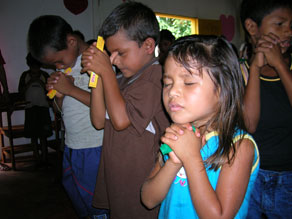Getting Saved
By Debie Thomas
The grown-ups are singing, "Just As I Am" in the pews behind me. I’m hemmed in by 5th graders, all of us kneeling on red carpet, and my forehead is pressed against a polished altar. My face is soaked and snotty, and I can’t breathe for the combination of hope, pain, and fear searing my chest. It’s the third night of our annual youth revival, I’m ten years old, and I'm asking Jesus to forgive my sins and come into my heart. I’m getting saved. Again.
Growing up, I got saved compulsively. Anxious about sin on the one hand, and attuned to “the stirrings of the Spirit," on the other, I spent a good chunk of my childhood on my knees. I got saved at the altar, in the pews, in the bathtub, and by my bed with an NIV Children’s Bible propped open on a throw pillow. The front page of that worn Bible, in fact, still documents my many salvations: June 1, 1981. January 5, 1983. March 24, 1984. April 7, 1987. Easter Sunday, 1988. Most of the dates are crossed out, signifying salvations that apparently didn't "take," and that required a do-over.
On the night described above, the preacher — a guest from some high profile children’s ministry — must have been particularly eloquent, and the second verse of the hymn (“Just as I am, and waiting not, to rid my soul of one dark blot, to thee whose blood can cleanse each spot, O Lamb of God, I come. I come.”) far too much for my tender conscience. I was the first kid to the altar.
I have alluded in previous columns and lectionary essays to a shift my faith is currently undergoing. It would be easy to slap labels on that shift (fundamentalist to progressive, evangelical to liturgical, charismatic to sacramental), but the labels matter much less to me than the "how?" the "why?" and the "so what?" of the shift itself. It will no doubt take many pages and years to explore these questions fully, but revisiting my childhood sprints to the altar feels like a good place to begin.
Why, I wonder now, did I feel so sinful — so barely saveable — at such a young age? I still remember how seriously my kid-self took the work of confession. I'd make laundry lists of "sins" in the margins of my journal: “Lord, I threw my broccoli — I hate broccoli — under my brother’s chair at dinner, so Daddy would think he did it." "Lord, I snuck Anne of Green Gables into the bathroom again, even though Mummy has told me a hundred times it’s dirty to read on the toilet." "Lord, I stole Tanya’s pink lip gloss at school, ‘cause I'm not allowed to buy lip gloss of my own.”
Once the sins were written out, I'd pray over them as if I were trying to move a concrete wall with my bare hands. I would push and push and push. So much effort, so little movement.
 |
The odd thing is that my jumbo-sized guilt and constant confession coexisted with a deep passion for God. From as early on as I can remember, I believed and I loved. I believed effortlessly, and with real pleasure. I read five chapters of the Bible every day because I wanted to, way down in my bones. I prayed heaps, about anything and everything. I carried notebooks and highlighters to Saturday Bible studies, and sat, riveted, through the driest of Sunday morning sermons. Church — God’s house — was my favorite place to be.
In so many ways, a loving hunger for God hounded my childhood, and yet that love didn't convince me of my salvation. It was as if — I see now — love didn't count in God's economy. Neither did desire. Neither did pleasure. The only religious emotion that counted was contrition. The worse I felt about my heart, I believed, the more I'd win over God's.
The other "truth" I believed about salvation was that it's a solid line drawn in the sand. The damned live on one side of the line, the saved on the other, and God, being holy, can't commune with people on the damned side. No wonder I scrambled to the altar so often; I needed to be sure what side of the line I stood on.
It will take another column — several other columns — to describe how much I benefited from the spiritual tradition that raised me. I have a great deal to be thankful for, and I hope to do justice to that gratitude in future essays. Right now, though, I have to grieve for that little girl who prayed so hard for an elusive salvation. I wish I could go back in time and offer her a do-over. Not a do-over at the altar. A do-over in her formation.
If I could, I'd gather her into my arms and tell her what I believe now:
Salvation isn't a line in the sand. God's favorite emotion isn't shame. The concrete wall is not of God's making, and the hands you're skinning bare against that wall are already covered in his. Your delight matters. Your passion matters. Your love matters.
Step away from the altar now. The God who loves you is waiting.
Image credits: (1) Catechesis in the Third Millennium.



